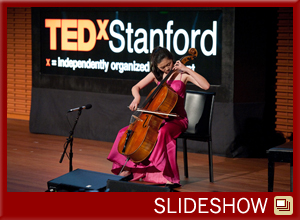TEDxStanford 'illuminates' Stanford's intellectual diversity
Saturday's TEDxStanford featured inspiring presentations and performances, addressing subjects ranging from early cancer detection to the consequences of misguided philanthropy and the joys of unconventional musical composition.
If you wanted to understand the complexity of the TEDxStanford program held Saturday, all you had to do was follow the organizer around in the minutes before the house lights dimmed.
Melinda Sacks' calmness in the minutes before the all-day event in Cemex Auditorium at the Graduate School of Business belied her responsibilities for nearly 600 guests, 27 presenters or performers, dozens of support staff and innumerable people watching the program live online.
They all came together in the spirit of the TED movement, which pursues "ideas worth spreading."
The performers and presenters were a who's who of the Stanford community, including television journalist Tom Brokaw, a Stanford parent; Time magazine humor columnist Joel Stein; and Broadway composer and producer Jay Kuo, both alumni.
They held forth on everything from advances in early detection of cancer to the sometimes-unfortunate consequences of foreign philanthropy and the adventures of an unconventional composer.
In the moments before TEDxStanford began, Sacks, director of media initiatives for Stanford's Office of Public Affairs, personified the challenges of staging the event, which was a year in the planning. Was it OK if tweets were broadcast live? Does the Huffington Post blogger need a Wi-Fi connection? Are all six of the video cameras ready for the live broadcast?
If Sacks' job seemed hard, imagine the challenge for TEDxStanford co-hosts June Cohen, director of TED Media, and David Hornik, a Palo Alto venture capitalist. Both Stanford alumni, their job was to bring coherence to a diverse program of musicians, poets, writers, academicians, dancers and a few presenters who defied definition.
Under the thematic umbrella of "Illumination," TEDxStanford performers and speakers inspired, moved and astonished in brief presentations. "Illumination" was chosen as the theme in the hope that attendees and viewers would look at the world in a different light, Sacks said.
Moving and entertaining
Among the presenters was Sanjiv Sam Gambhir, a Stanford medical researcher, who warned the audience, "Many of you have cancer now, but we won't know it for perhaps a decade."
Gambhir talked about emerging technology designed to detect cancer before symptoms appear by inserting tiny "spies" into the body to look for telltale signatures of the disease. He illustrated his talk with images of cancer in a patient and then revealed at the end of his talk that the patient with breast cancer was, in fact, his wife.
"She is the reason I am up here today making all this work possible," he said.
Equally moving was Martha Muña, student director of the KaeMe Foundation, a nonprofit that supports Ghana's children. Muña described misguided foreign philanthropy that created unneeded orphanages in Ghana. Financial incentives to orphanages have had the unintended effect of tearing children from their families. Today, KaeMe returns children to their families, places true orphans in foster homes and redirects foreign aid to needed community services.
The lesson, she said, is that philanthropy should be pursued "thoughtfully and carefully. Never fix problems that didn't exist."
Revealing moments of levity
Stein, a former Stanford Daily editor, humorously guided the audience through his evolution into manhood. For his book, Man Made: A Stupid Quest for Masculinity, he submitted himself to, for instance, military basic training, wrestling and firefighting. In the end, Stein realized that achieving manhood really means embracing adult obligations.
Composer Mark Applebaum, associate professor of music, outlined his efforts to overcome "boredom" by combining music with oftentimes-amusing roles, including inventor, choreographer and scavenger.
He demonstrated, for instance, musical instruments he has invented and unconventional musical compositions he has written, including one that humorously features a florist creating floral designs to orchestral accompaniment.
Ultimately, he said, he realized that the question of "what is music" is less important than the question of "what is interesting."
He urged audience members to ask similar questions in their lives, adding, "I allow my creativity to push me in directions that are simply interesting - moving beyond the paradigm of conventional music."
Producing TEDxStanford
The day began with spirited drumming from Stanford Taiko, delivering a performance that roused the audience out of any weekend sleepiness. Tickets for the event had sold out in April, just 50 minutes after they went on sale.
The global phenomenon known as TED started in 1984 and has spawned numerous offshoots, including independent, community-based events like TEDxStanford.
Christine Campbell of Saratoga, a veteran of TED and TEDx events, called Stanford's effort "fantastic. These were super high-quality speakers and the audiovisual was of the highest quality."
Larry Kubal, a Stanford alumnus and frequent TED and TEDx participant, said he left the event with his "head still swimming."
Cohen said she is eager to return to TED headquarters to add TEDxStanford presentations to the repository of talks made available online at TED.com. TEDxStanford, she said, showcased the "unique talents at Stanford."



Share This Story